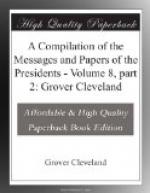A restriction of the power “to provide for the common defense and general welfare” to cases which are to be provided for by the expenditure of money would still leave within the legislative power of Congress all the great and most important measures of Government, money being the ordinary and necessary means of carrying them into execution.
If a general power to construct roads and canals, and to improve the navigation of water courses, with the train of powers incident thereto, be not possessed by Congress, the assent of the States in the mode provided in the bill can not confer the power. The only cases in which the consent and cession of particular States can extend the power of Congress are those specified and provided for in the Constitution.
I am not unaware of the great importance of roads and canals and the improved navigation of water courses, and that a power in the National Legislature to provide for them might be exercised with signal advantage to the general prosperity. But seeing that such a power is not expressly given by the Constitution, and believing that it can not be deduced from any part of it without an inadmissible latitude of construction and a reliance on insufficient precedents; believing also that the permanent success of the Constitution depends on a definite partition of powers between the General and the State Governments, and that no adequate landmarks would be left by the constructive extension of the powers of Congress as proposed in the bill, I have no option but to withhold my signature from it, and to cherishing the hope that its beneficial objects may be attained by a resort for the necessary powers to the same wisdom and virtue in the nation which established the Constitution in its actual form and providently marked out in the instrument itself a safe and practicable mode of improving it as experience might suggest.
JAMES MADISON.
PROCLAMATION.
[From Annals of Congress, Fourteenth Congress, second session, 218.]
WASHINGTON, January 1, 1817.




